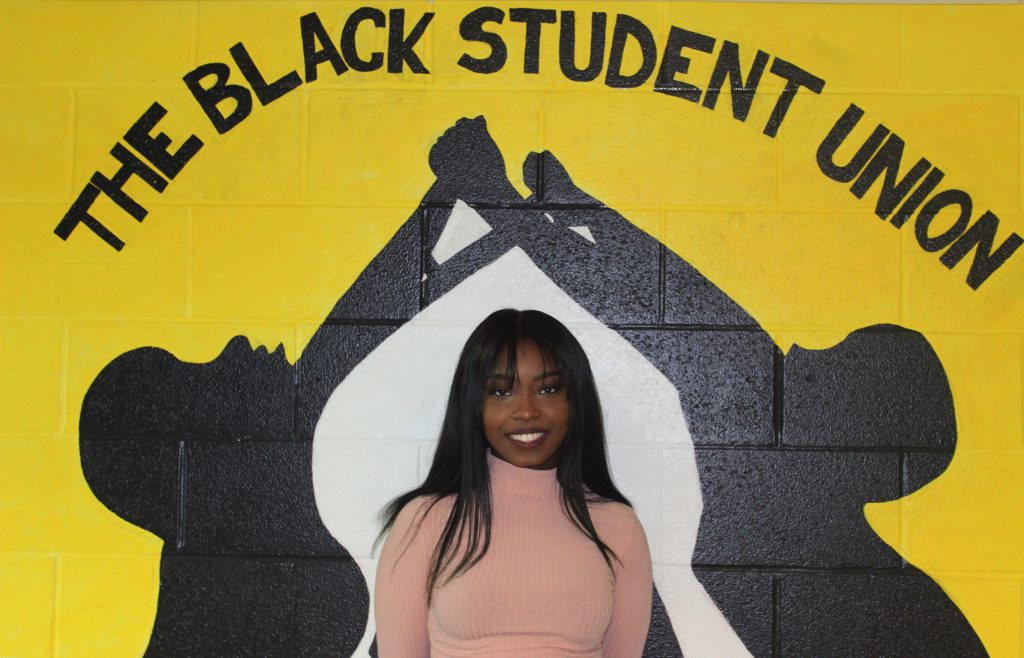
PRISM: How long have you been involved in BSU? What made you want to take on the leadership for BSU?
Monet Schultz: I’ve been involved in BSU since my freshman year at Binghamton, I saw their table at the Binghamton Enrichment Program weekend. I then became an intern for them, then publications coordinator, then the vice president and, finally, now I am the president. I wanted to be the president of BSU because I felt like I had a duty to do. I know a lot about the organization and I felt like I had a lot to offer the black community on campus. It is my senior year, and I felt like it was something I needed to do; if not me, then who else? It was that kind of thing. My entire existence revolves around blackness and black liberation.
P: What is black artistry and what does it mean to you?
MS: Black artistry is everything that is blackness to me. It isn’t just paintings, not just music. Black artistry is like the black girl that gets up and beats her face and goes through her 9 to 5. That is black artistry to me. It is also the guy that is sitting in his home, and creates his own home studio and he wants to be a rapper or a motivational speaker. Black artistry is not what is conventional to the status quo, but is like everything that allows blackness to exist in a space that tries to stifle black creativity.
P: What was the experience like to come to the United States after living in Guyana? How has it affected you and influenced your thinking?
MS: I came here when I was 10 years old, and have been in the United States of America for 12 years now. I am very involved in Guayana still. Being Guyanese is very interesting to me because in Guyana there is no black and white binary. Instead, there is a black and Indian binary that exists there. So the anti-blackness and white supremacy is a lot more covert there than it is in America. When I came to America, I didn’t know I was black until I was told I was black. In Guyana, you’re just Guyanese — you’re black, but the implications are so different. Blackness in Guyana is now reaching a point where they are becoming aware that they are Afro-Guyanese, and people are standing firm in their identity. Here, I have a different perspective on immigration, and a different perspective on what it means to be black in totality, but also what it means to be West Indian and what it means to be perceived as African American or what it means to have that West Indian-African divide versus the African-American divide. So it’s like a bridge that I am working on closing. I still have family members that don’t think they are black because they are Guyanese. They think that being black is synonymous with African American when in reality that’s not what it is.
P: What does Black History Month mean to you?
MS: Black History Month means something different every year. Every year I try to channel a different energy into Black History Month. I think, overall, Black History Month is just a symptom of black excellence. It’s the month that we get to celebrate ourselves. I think Black History Month sets the tone for celebrating yourself all year round until the next February comes around. February is what, 28 days? It doesn’t mean that much in the grand scheme of things. You know how you have to start off a race strong, that’s what it is, you start off the year strong. You start off January preparing for Black History Month, that’s when you get to your peak and you excel. I used to run track, so I think about things in terms of races. So, you get to your peak and excel, and then you don’t lose control for the rest of the year — celebrating yourself, celebrating your blackness and everything about blackness.
PRISM has edited this interview for length and clarity.
“Voices of Binghamton” is a column created to give voice to branches of the campus that may have previously gone unheard or underrepresented. It is a space that illuminates the stories of our current leaders and those who intend to be our future leaders. If you know anyone who should be featured in subsequent installments, please submit names to spandey2@binghamton.edu


